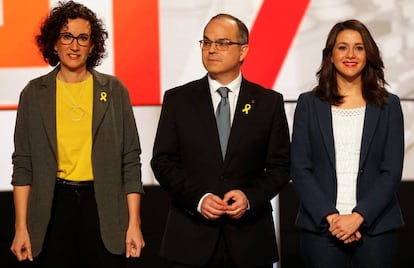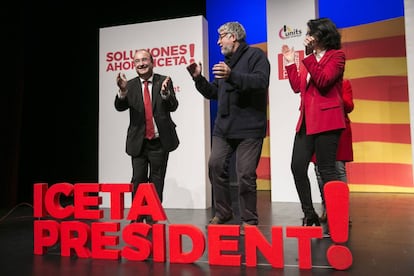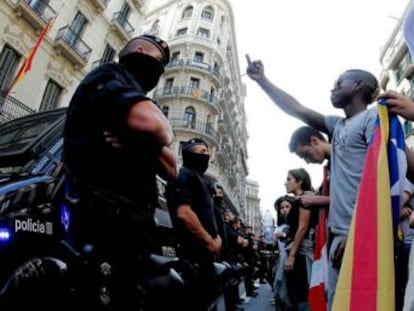The new leading parties in Catalonia’s shifting political landscape
In a deeply divided region, Ciudadanos and the Catalan Republican Left seem to be taking over

The Catalan campaign race that ended on Tuesday has seen a shift in the region’s political landscape. The two parties that had enjoyed a predominant position for many years – Convergència, now rebranded as the European Democratic Party of Catalonia or PDeCAT, and the Catalan Socialist Party (PSC) – have been upended by two traditionally smaller players, Ciudadanos and the Catalan Republican Left (ERC).
Surveys suggest that the reform-oriented, anti-independence Ciudadanos has replaced the Socialists in urban settings, while ERC has taken over from PDeCAT as the premier nationalist party in Catalonia.
The left and the bourgeoisie who thought they owned management rights over this country now have a rival to contend with
Marta Rovira, ERC
Gone are the days of two-party hegemony that PSC and Convergència (as part of the CiU federation) enjoyed for years, particularly in the 1980s and 1990s when they collectively attracted 75% of the vote. And there is little indication that this situation is going to return any time soon.
In a regional assembly with seven parties, surveys are awarding Ciudadanos and ERC a sum of votes that does not quite reach 50%, meaning that neither one of them will be able to form a government without alliances with other parties.
Both frontrunners have made the most of their new status during the campaign race. At a party rally in L’Hospitalet, Ciudadanos leader Albert Rivera appealed to tactical voting, arguing that a victory over ERC will be decided by very few votes. He also addressed undecided voters, especially those “hesitating between Ciudadanos and PSC.”

“If you vote for PSC, you don’t know where your vote is going; but nobody doubts that a vote for Ciudadanos is going to stop the independence process in its tracks,” he said, alluding to the fact that the Socialists might seek to form a leftist alliance with ERC and Catalunya en Comú or Commons, a group that includes Podemos.
The latter party has adopted a middle-of-the-road position on independence, saying they oppose unilateral secession but also the application of Article 155, which gave Madrid emergency powers to restore the law in the breakaway region. This snap election was called by Prime Minister Mariano Rajoy as part of those measures.
Rise of ERC
Meanwhile, the ERC is styling itself as the “central” party of the Catalanist movement, as opposed to PDeCAT (running in this election under the name Junts per Catalunya), which has manifestly ceased to hold that position.
The Catalan Republicans also like to highlight the fact that the party was founded in 1931. “It’s important for ERC to head the government. It is not a party that’s been cobbled together four days ago. This is a party with a long history,” said former government official Carles Mundó.
Both frontrunners have made the most of their new status during the campaign race
That’s unlike its nationalist rival Junts per Catalunya, created just one week before the campaign race kicked off. And ERC leaders are also taking aim at PDeCAT’s origins as the party of the Catalan bourgeoisie.
“The left and the bourgeoisie who thought they owned management rights over this country now have a rival to contend with,” said ERC official Marta Rovira about the PSC and PDeCAT.
A reshuffle
Lluís Orriols, who teaches political science at Carlos III University, sees this battle as “a reshuffle of the Catalan party system.” He feels that Convergència’s constant changes to its name, leadership and platform have “made it postpone its homework, which is to seek a consolidated position with a midrange project.” This has benefited ERC in a “structural” way.
However, Orriols is more skeptical about whether Ciudadanos’ lead over the PSC can be sustained in time. “Ciudadanos has managed to become the focal party of non-secessionists at a regional election, but its voters tend to abandon it for other parties when general elections come around,” he says. “This space is still up for grabs.”
English version by Susana Urra.
Tu suscripción se está usando en otro dispositivo
¿Quieres añadir otro usuario a tu suscripción?
Si continúas leyendo en este dispositivo, no se podrá leer en el otro.
FlechaTu suscripción se está usando en otro dispositivo y solo puedes acceder a EL PAÍS desde un dispositivo a la vez.
Si quieres compartir tu cuenta, cambia tu suscripción a la modalidad Premium, así podrás añadir otro usuario. Cada uno accederá con su propia cuenta de email, lo que os permitirá personalizar vuestra experiencia en EL PAÍS.
En el caso de no saber quién está usando tu cuenta, te recomendamos cambiar tu contraseña aquí.
Si decides continuar compartiendo tu cuenta, este mensaje se mostrará en tu dispositivo y en el de la otra persona que está usando tu cuenta de forma indefinida, afectando a tu experiencia de lectura. Puedes consultar aquí los términos y condiciones de la suscripción digital.










































